Overview
CMS contact consists of detailed information of customer's contact. Users can search the customer's contact and redirect to the Contact detail. The searched contact will be listed on the contact detail.
Users can apply the filter which helps with searching for the required contact quickly. The CMS contact features filter, contact detail, favorite action, and navigations are essential for contact information. Customer contact is a customer representative having either of the roles like
- Branch manager
- HR manager
- Invoice Attn to (i.e., the person to whom the invoice of the customer is sent)
- Main contact
- Marketing main
- Owner
- Payroll contact
- Report to person
- Supervisor
- Time approver
- VP
- Other roles
Note: These roles may depend upon the customer’s requirement.
A job is defined depending on the role of the contact. According to the role, access is provided to the contact. i.e., the 'Time Approver' will have access to approve the time entry of the employee but the 'HR manager' won’t have access to approve the time entry.
Contact Directory
The contact directory consists of a filter, 'Add' contact button, and a 'Search' /'Recent' toggle button.
Users can search for the customer's contact from the 'Search'/'Recent toggle button that displays the list of customer's contact. The filter helps to filter the required contact records. Users can also add contacts under required customers and redirect to the contact detail from the directory.
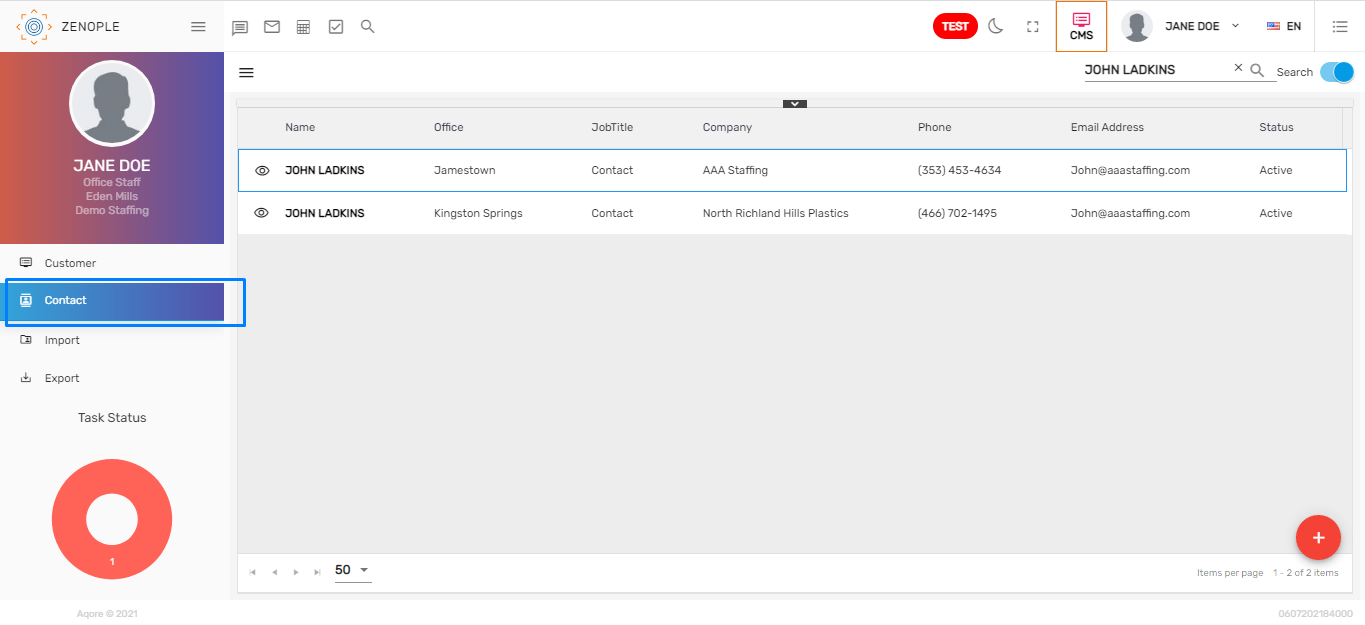
Add Contact
The 'Add' button allows the users to add a contact under a customer.
Users can simply add a contact by clicking on the 'Add' icon and entering the contact detailed information.
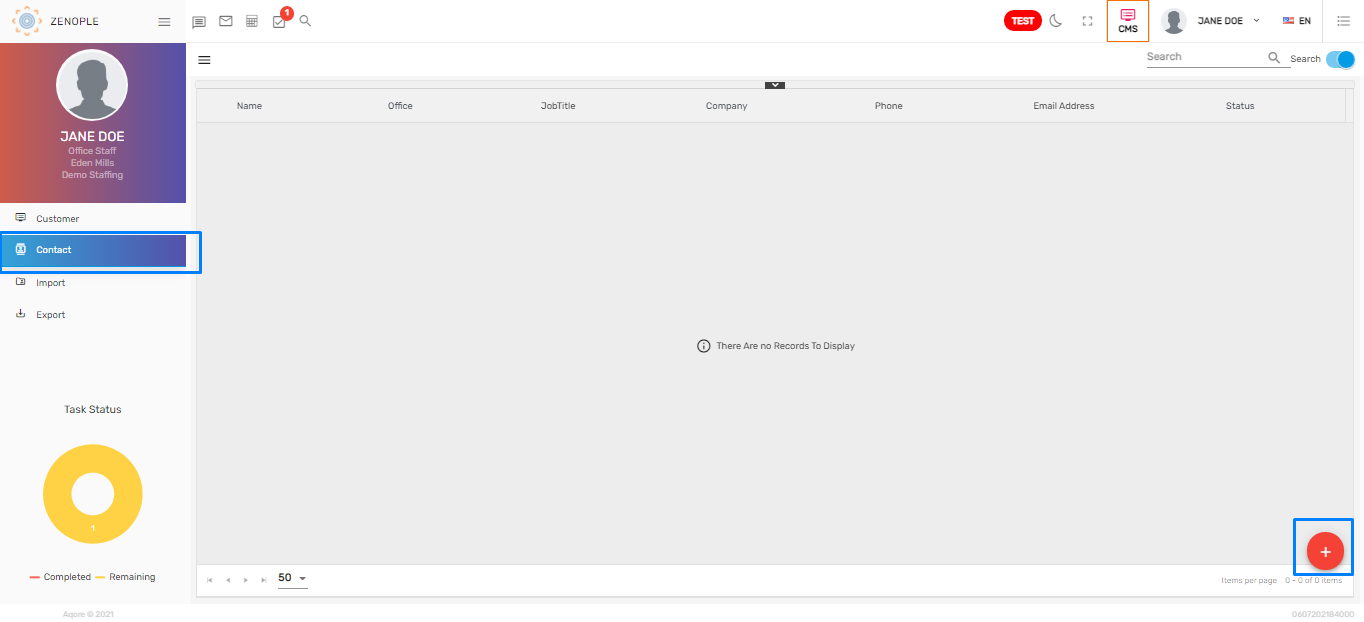
A form to add 'Contact' will open and providing the details will add a contact. If the contact has an extension number, the 'Ext.' field can be used to set the number.
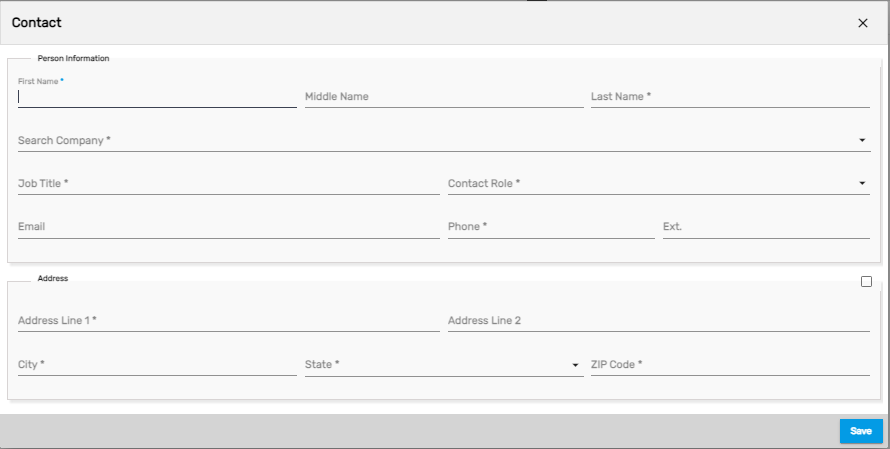
Select a 'Contact Role' for the contact. Depending on the contact role selected, the task of the contact is defined.
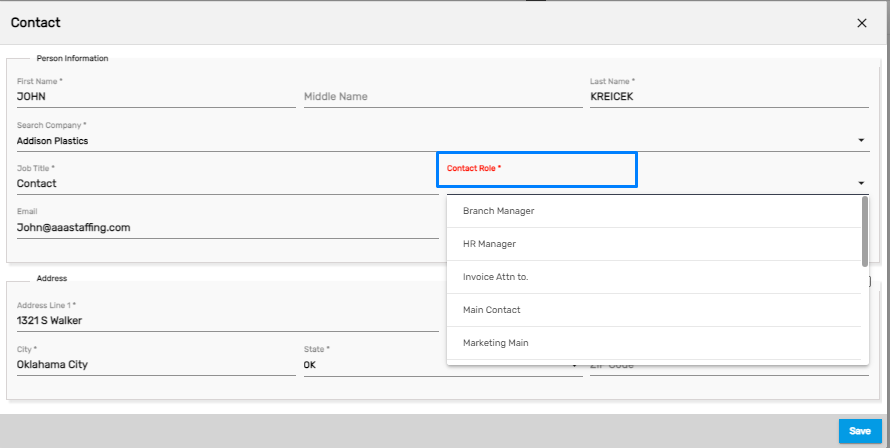
By selecting the 'Copy From Organization', the address of the contact can be copied from the customer. After filling all the details, click on the 'Save' button to add a contact.
After filling all the details, click on the 'Save' button to add a contact.
Filter
Contact includes a filter option that helps to search the required contact quickly.
Using this filter will display the contact on the basis of the selected options. This filter feature can be used from the hamburger icon.
.png)
The filter consists of different filter options like 'Filter Status', 'Status', 'User Role'.
User needs to 'Enable' the filter status, to enable other filter options. The options can be customized as per the client's requirements.

Note: The filter options can be customized as per the client's requirement.
Search /Recent toggle button
The 'Search' toggle button allows searching the contact from the contact directory, whereas the 'Recent' toggle button displays the most searched and visited contact records.
Contact Detail
Contact detail features detailed information of all the contacts. Users can redirect to the 'Contact Detail', by searching contacts from the search bar. 'Search' toggle button off will filter the recent and viewed contact records only.
All the related searched records will be listed and clicking on the eye view icon or clicking on the contact name will redirect to the Contact Detail.
 The Contact Detail consists
The Contact Detail consists
1. The contact’s detail like the ID, the office and company under which the contact is created, the customer's name, the full address, and the phone number.
2. Favorite action
3. Navigations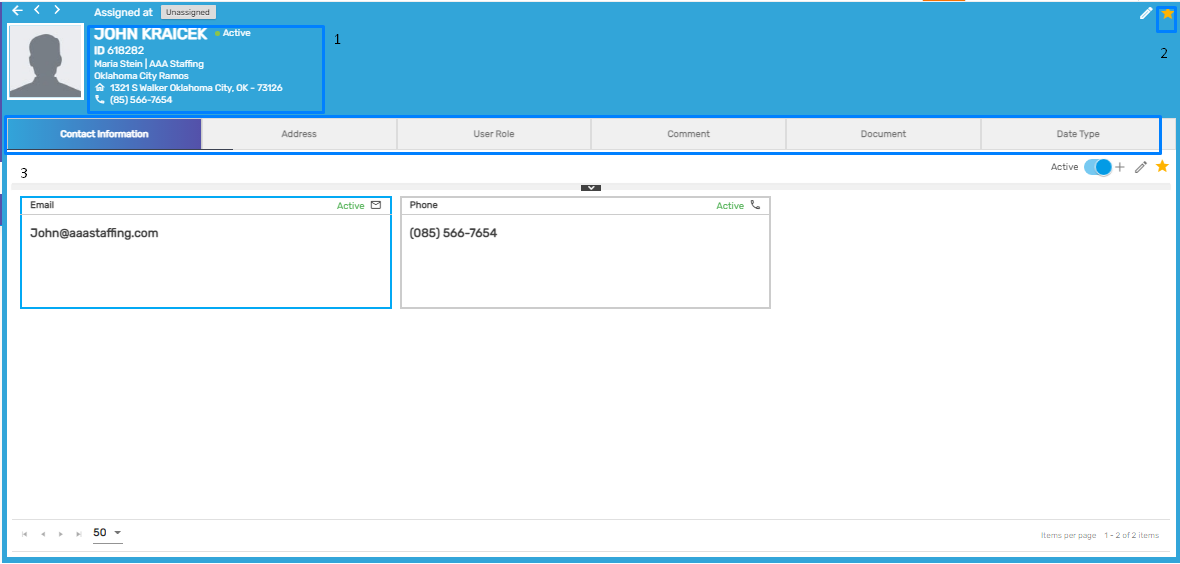
Favorite Actions
The contact detail consists of the various favorite actions. They are,
1. Edit
2. Login Info
3. Refresh
1. Edit
This action allows the users to update the details of the contact. Clicking the 'Edit' action under the favorite icon and updating the details will edit the contact details.
If the contact has an extension number, the 'Ext.' field can be used to set the number.
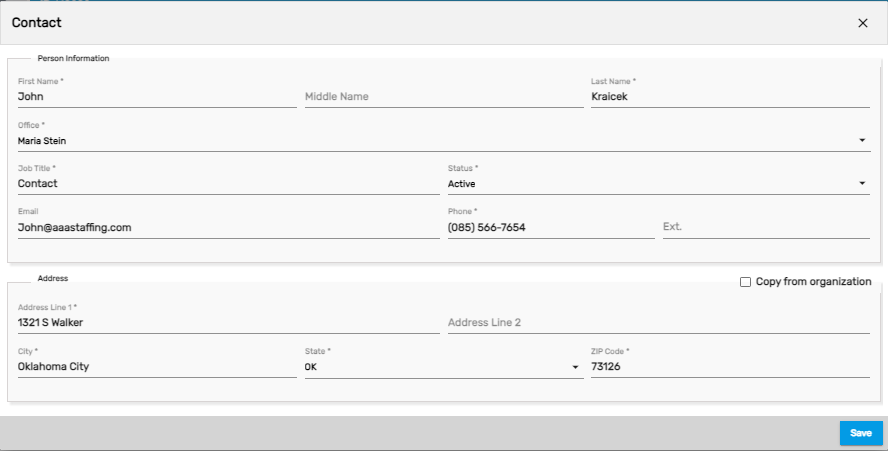
2. Login Info
The login information of the contact can be viewed from this action. Clicking the 'Login info' action under the favorite icon, the login credential is displayed as below.

Users have access to the credential change option, they can update the contact's username and password. To disable the login of the contact, turn off the 'Active' toggle button and to view the password, click on the eye view.
3. Refresh
It allows the users to refresh the contact detail if any records are not reflected. Similarly, there is a refresh action in each top and side navigation of contact which will refresh the navigation records.
Navigation
The CMS contact has six main navigations. They are:
- Contact Information
- Address
- User Role
- Comment
- Document
- Date Type
Contact Information
This top navigation shows the contact information like the address, email of the contact, etc. It allows users to add, edit and set the contact information as primary contact information. The contact information type depends upon the client's requirements.
The contact information which was filled up when the contact was added, will be seen in this top navigation.  Only one record under the same contact information type can be set as primary contact information. One of the contact information needs to be primary contact information. The primary contact information will be updated on the detail of contact.
Only one record under the same contact information type can be set as primary contact information. One of the contact information needs to be primary contact information. The primary contact information will be updated on the detail of contact.
To add and edit the contact information, the process is similar to all the applications.
Address
This top navigation shows the address of the contact. Depending upon the customer’s requirement the contact address type will differ. It allows the users to add and edit multiple addresses of the contact.
The address provided when the contact was added will be listed under the address navigation.
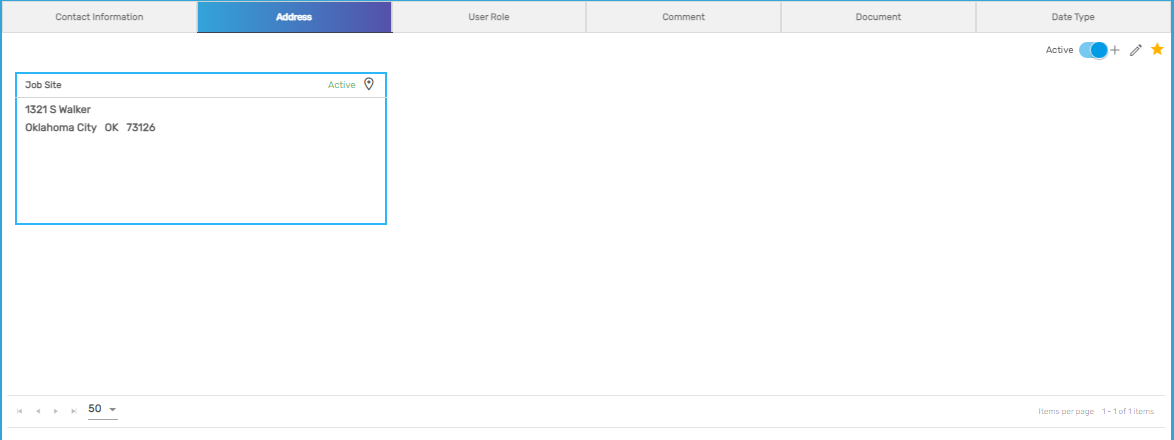
'Set As Primary' action will set an address as a primary address. Only one of the addresses can be set as a primary address. The primary address will be updated on the detail of contact.
To add and edit the address, the process is similar to all the applications.
User Role
This top navigation shows the directly involved users of the contact like users who entered the contact (Entered By) or users who recruit the contact (Recruiter). It allows users to add, edit multiple user roles of the contact.
The standard user roles are 'Entered By' and 'Recruiter' but these roles can be customized as per the organization's requirement.

To add and edit the user's role, the process is similar in all the applications.
Comment
This top navigation shows all the comments of the contact for different comment types under different categories. It allows users to write multiple comments associated with the contact and also update them. The comment type and comment category can be defined on the basis of the customer’s requirement. Users can view, add, edit the comments of contact under various categories and types. These comments are displayed in the contact's profile with the name of the comment adder and the date on which the comment was added.
To add and edit the comment, the process is similar in all the applications.
The view action will allow users to view the comment report. This report shows the comment added by a users for the contact.
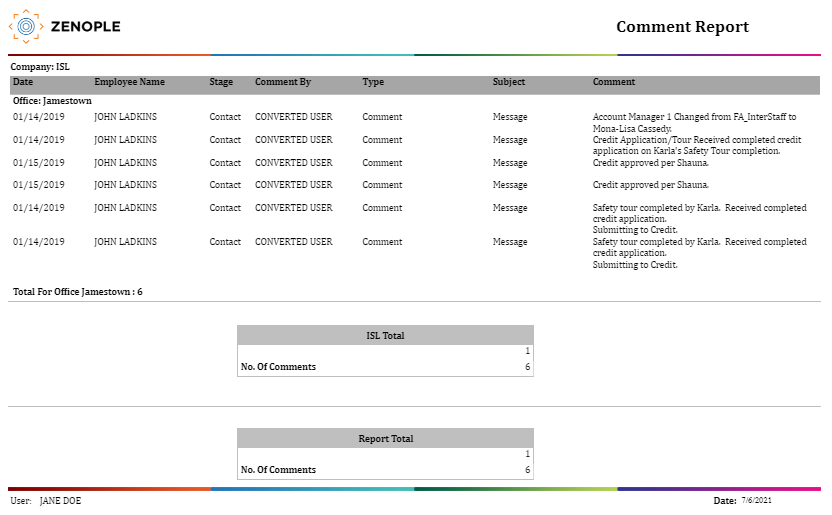
Document
This top navigation shows the contact’s document like the contract or any other related documents. It allows users to view and download the document. Also, users can 'Add' and 'Edit' the contact’s document. The documents will be displayed in the contact's profile. The document may be an image, word file, excel, pdf, etc. Users have access to view the document by clicking on the eye view and click on the download button to download the document.
.png)
To process to view, download, add and edit a document, is similar across all the applications.
Date Type
This top navigation shows the directly involved users of the contact like the date on which users hired the contact (Hired Date) or the date on which users updated the password (Last Password Change Date). It allows users to add, edit multiple date types of the contact. The standard date type is hired date and the last password change date. These date types can be customized as per the organization's requirements. The process of adding and editing the date type, is similar across all the applications.
The process of adding and editing the date type, is similar across all the applications.